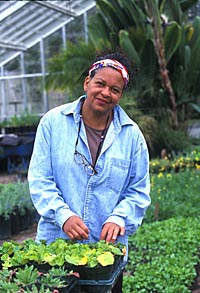Around the world, graduates of the UCSC Apprenticeship in Ecological Horticulture are improving the health of the environment through organic food production, education, advocacy, and social service programs. Here's a sampling of what a few graduates have done since leaving the UCSC Farm.
Vanessa Campbell, 1992
Alex Brown, 1998
Leicester, NC
Campbell and Brown operate Full Sun Farm, cultivating a large variety of vegetables, flowers, strawberries, and blueberries for two growers' markets and a 36-member Community Supported Agriculture (CSA) program.
Tim Crews, 1981
Prescott, AZ
Crews (B.A., environmental studies, '85) is a professor of agroecology at Prescott College in Arizona and director of Wolfberry Farm, the college's satellite campus for education, research, and demonstration of agroecology.
Colby Eierman, 1999
Napa, CA
Eierman is director of gardens for COPIA: The American Center for Wine, Food and the Arts in Napa, California.
David Griffiths, 1976
Phoenixville, PA
Griffiths operates Seven Stars Farm, a 350-acre certified organic and biodynamic dairy farm that produces organic yogurt for distribution throughout the eastern United States.
Oran Hesterman, 1971
Battle Creek, MI
Program director of the W. K. Kellogg Foundation's Food and Society Initiative, Hesterman will move in January 2008 to the Fair Food Foundation, where he will be the inaugural president and chief executive officer.
Terry Hooker, 1996
San Luis Obispo, CA
Following the apprenticeship, Hooker enrolled as an undergraduate at California Polytechnic State University, San Luis Obispo, and subsequently helped transform this major agricultural school by expanding the Student Experimental Farm and cofounding SARC, the Sustainable Agriculture Resource Consortium.
Abby Jaramillo (Rosenheck), 2000
San Francisco, CA
Jaramillo is executive director of Urban Sprouts in San Francisco, a school garden organization that serves low-income youth from underserved neighborhoods.
Godfrey Dembe Kasozi, 1999
Kasese, Uganda
Kasozi directs the Organic Centre for Environment Technology and Rural Development (CETRUD), an organic farming and training center that offers business advice, grower training, demonstrations, and production of organic products.
Jered Lawson, 1994
Nancy Vail, 1997
Ano Nuevo, CA
Lawson (B.A. community studies, '92) and Vail founded Pie Ranch as a center for education and social change through hands-on learning about the cycle of food production. With outreach activities in nearby cities, Pie Ranch fosters stronger relationships between urban and rural communities.
Kevin Loth, 1988
Charuth Loth
Lincoln, NE
After completing the apprenticeship in 1988, Kevin Loth earned a B.A. in environmental studies from UCSC in 1991. He and Charuth, a research associate at the Center for Agroecology & Sustainable Food Systems, relocated in 1995 to rural Nebraska, where they operate ShadowBrook Farm, a 34-acre farm that has helped create demand for fresh, local, organic produce. The Loths are considered the Midwest experts in small-scale, local, organic production.
Edwin Marty, 1998
Page Allison, 1998
Birmingham, AL
Marty and Allison cofounded Jones Valley Urban Farm, a nonprofit environmental education center that converted vacant city lots into four small farms that host job-training, educational, and community programs and supply restaurants and farmers markets with fruits, vegetables, and cut flowers.
Brian McElroy, 1994
Davenport, CA
After finishing the apprenticeship, McElroy spent 12 years with California Certified Organic Farmers, where he oversaw the annual certification of more than 1,300 growers and food processors to ensure compliance with state, federal, and international organic standards. In 2006, McElroy joined Watsonville-based Driscoll's Strawberry Associates to manage their organic program.
Damian Parr, 1991
Davis, CA
Parr (B.A., environmental studies, '00) is finishing a Ph.D. in agricultural education at UC Davis, where he is developing curricula about sustainable agriculture education. His goal is to help replicate UCSC's programs and to integrate sustainability into mainstream agriculture education.
Kathi Colen Peck, 1995
Greg Peck, 1996
Ithaca, NY
Kathi Peck is the farm leader for Compos Mentis (Latin for "of sound mind"), a nonprofit that operates a 40-acre farm as a haven for young adults who have been diagnosed with depression, bipolar disorder, or schizophrenia. Greg Peck is a Ph.D. student at Cornell University, where he is researching the sustainability of organic fruit production systems for New York State.
Moraig Peden, 1986
Durban, South Africa
Peden teaches at the University of KwaZulu-Natal, training aspiring high school teachers who will specialize in agricultural science.
Corie Pierce, 2005
East Lansing, MI
Pierce is the farm manager and an instructor at the Student Organic Farm at Michigan State University, where she developed the Organic Farming Certificate Program, a 12-month apprenticeship that encompasses a year-round CSA and seasonal farm stand.
Kim Slotnick, 1990
Josh Slotnick, 1991
Missoula, MT
Kim and Josh own Clark Fork Organics, where Kim oversees production of vegetables, berries, flowers, and eggs. Josh, a member of the environmental science faculty at the University of Montana, established the university-based Program In Ecological Agriculture and Society (PEAS) in 1997, the same year he cofounded Garden City Harvest, a nonprofit that provides high-quality food to low-income people.
Cathrine Sneed, 1987
San Francisco, CA
In 1982, after a life-threatening illness, Sneed launched a gardening program at the San Francisco County Jail where she was a counselor. After honing her skills and knowledge during the apprenticeship in 1987, Sneed returned to the jail and launched the post-release program known as The Garden Project in 1992. This nationally recognized program provides on-the-job training for former inmates in gardening and tree care and boasts a return-to-prison rate of 24 percent, compared to the average recidivism rate of 66 percent.



